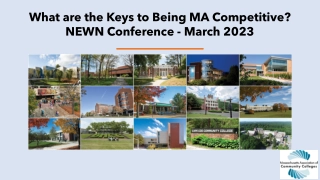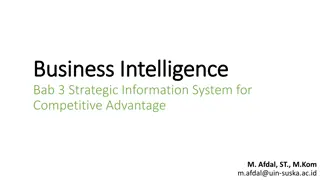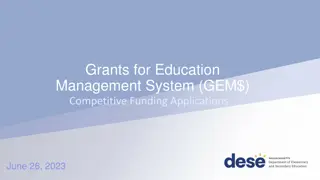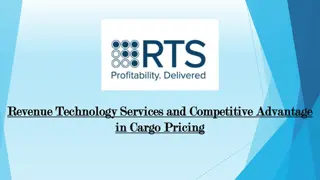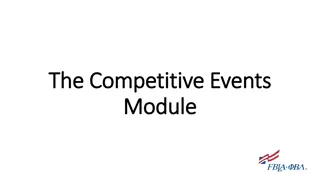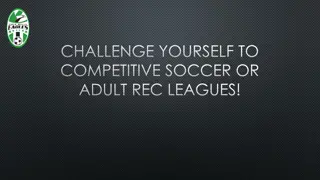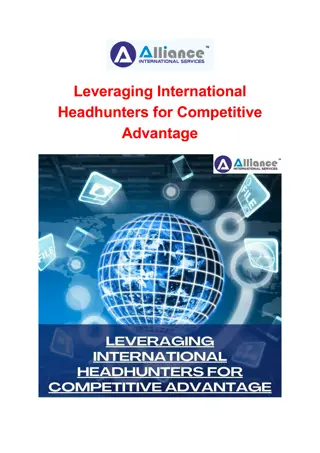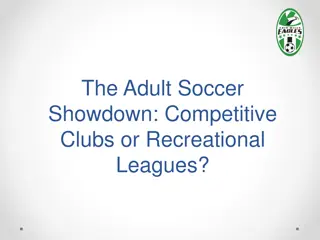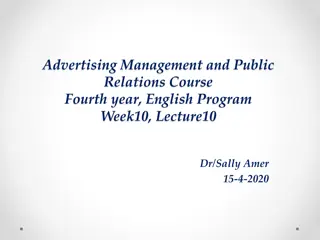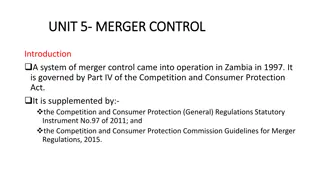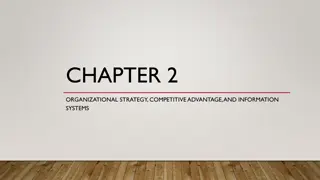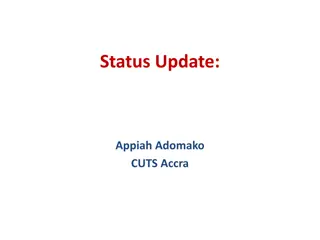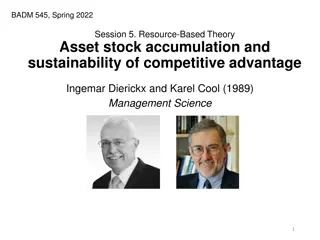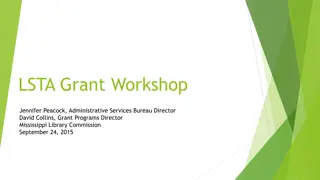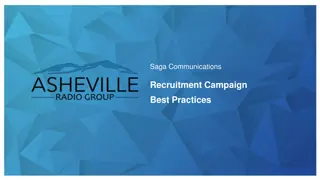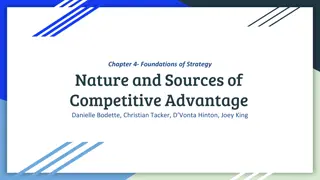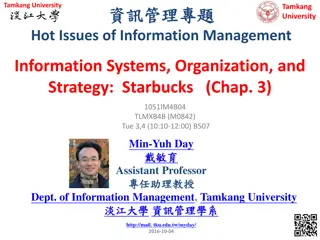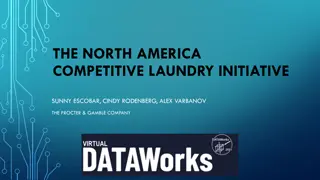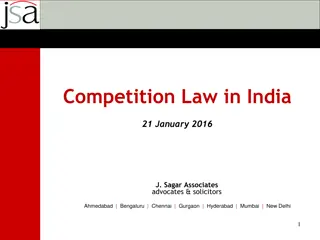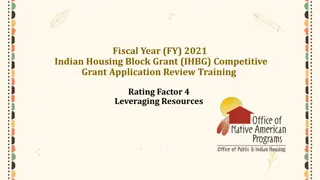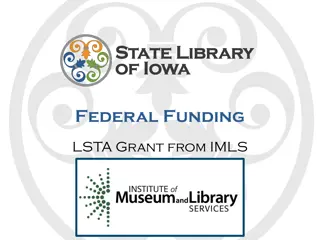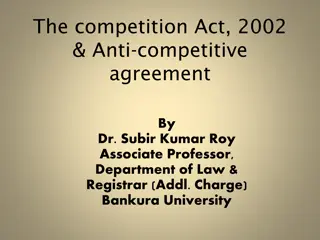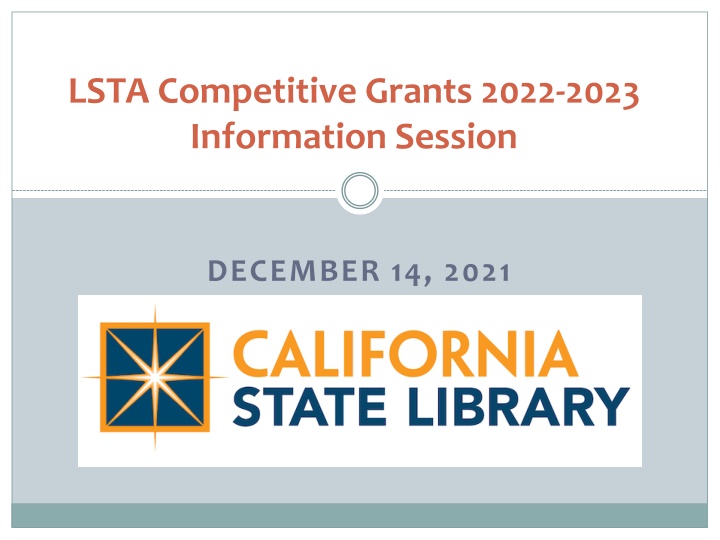
California State Library LSTA Competitive Grants 2022-2023 Information Session
"Learn about the competitive LSTA grant opportunities offered by the California State Library to support local projects aligning with community needs, aspirations, and diversity. Eligible applicants can access funding through Zengine, focusing on equity and inclusion."
Download Presentation

Please find below an Image/Link to download the presentation.
The content on the website is provided AS IS for your information and personal use only. It may not be sold, licensed, or shared on other websites without obtaining consent from the author. If you encounter any issues during the download, it is possible that the publisher has removed the file from their server.
You are allowed to download the files provided on this website for personal or commercial use, subject to the condition that they are used lawfully. All files are the property of their respective owners.
The content on the website is provided AS IS for your information and personal use only. It may not be sold, licensed, or shared on other websites without obtaining consent from the author.
E N D
Presentation Transcript
LSTA Competitive Grants 2022-2023 Information Session DECEMBER 14, 2021
Content Introduction to Presenters Purpose statement Eligibility Overview of grant opportunities Funding period Local competitive grants & collaborative competitive grants Preparing the application form (5 sections) Evaluation criteria Timeline Contact information Question
Presenters Natalie Cole, Bureau Chief Reed Strege, Assistant Bureau Chief Lynne Oliva, Grants and Bureau Operations Manager
Presenters: Library Programs Consultants Chris Durr Meg DePriest Lena Pham Shana Sojoyner Jody Thomas Bev Schwartzberg
Purpose Statement The California State Library s competitive LSTA grant opportunities: help libraries respond effectively to local needs and align services with community aspirations; support experimentation and research & development in California libraries; and provide training and support for grant writing and grant management for the California library community.
Purpose Statement (cont.) We invite libraries to apply for funding to support local and collaborative projects that: o address community needs; o align with community aspirations; and o support equity, diversity, inclusion, and belonging.
Purpose Statement (cont.) We are especially interested in: o applications from library jurisdictions that have not received LSTA funding in the past five years, and o for collaborative projects, applications that represent a variety of regions, library sizes, and populations. However, we welcome applications from all California library jurisdictions and library consortia, and on any topic and serving any group.
Eligibility In order for applicants to be eligible for LSTA funding, they must: o Adhere to LSTA guidelines on eligibility o available on the State Library s LSTA webpage. o Adhere to federal restrictions on funding o available on the State Library s LSTA webpage. o Use funding according to the Uniform Administrative Requirement Cost Principles and Audit Requirements for Federal Awards. o Comply with the Children s Internet Protection Act (CIPA) in order to use grant funds to purchase devices that can connect to and browse the Internet. o Public libraries that receive funding must participate in the Public Libraries Survey each year.
Opportunities o Local Competitive Grants support projects that focus on one library jurisdiction and can include projects focusing on one branch in one library jurisdiction. o Collaborative Competitive Grants support projects that are implemented by three or more library jurisdictions.
Funding Period The funding period starts when the California state budget is signed (typically July 1) and ends June 30, 2023. Projects will be selected in the Spring. Awards cannot be made until federal IMLS funding levels are confirmed for 2022-2023 and the 2022- 2023 California State budget has passed.
Local Competitive Grants o Open to California libraries. o Up to 14 outlets: may apply for one local grant o Between 15 and 30 outlets: may apply for two local grants o 31 or more outlets: may apply for three local grants. o $10,000-$100,000. o One community connection in place; must be named o Applicants requesting $75,000 or above should have at least one project partner in place; must be named. o Local match is expected.
Collaborative Competitive Grants o Open to California libraries, library consortia, and library- focused non-profit organizations. o Must include at least three California libraries; submissions must be signed by all participating libraries. o May not be submitted speculatively on behalf of other agencies. o $50,000 to a maximum of $250,000. Requests are expected to align with the project s scope and anticipated impact. o One community connection in place; must be named. o One project partner in place; must be named. o Local match is expected.
Application Process o Contact LSTA team (LSTAgrants@library.ca.gov) if coaching and support during grant writing period is desired. Please contact us for this opportunity by February 1st, 2022 o Applications will be reviewed by State Library staff and Project Advisors. o Not all applicants are guaranteed to receive funding. o Successful applicants will be assigned a Grant Monitor and Project Advisor.
Completing the Application o Agency Information o Project Description o Brief Abstract o Impact to Date (if applicable) o Community Needs, Aspirations, and Assets o Community Involvement o Equity, Diversity, Inclusion, and Belonging o Partners and Community Connections
Project Partners and Community Connections o Project partner: a cooperating institution, designated through a formal, signed agreement, which contributes resources (materials/funds/staff) to one or more of the project activities as outlined later in the application. o Community connection: a cooperating institution or agency with which the applicant will work to achieve project goals but with which the applicant might not have a formal, signed agreement.
Completing the Application, Continued Project Intent Choose only ONE. o Lifelong Learning o Information Access o Institutional Capacity o Economic & Employment Development o Human Services o Civic Engagement
Completing the Application, Continued Planning and Evaluation: Anticipated Project Outputs oQuantifiable measures. oServices/products to be created or provided. oCount how many events/services/products. oCount how many people you anticipate will participate or benefit.
Completing the Application, Continued Planning and Evaluation: Evaluation Plans oMeasuring outcomes, not outputs. Outcomes = changes in audience s skills, knowledge, behavior, attitude, status, life condition. oUse the LSTA surveys to evaluate relevant project activities. oDescribe additional plans for evaluation: local outcomes measures, for example, or evaluation report.
Completing the Application, Continued Planning and Evaluation: Sustainability oWhat happens after the award end date? oHow will the work of the project be continued if it is successful? oIdentify potential funding sources to sustain the work.
Completing the Application, Continued Activities = actions that accomplish project intent and objectives. Four choices: you can have one or more. oInstruction oContent oPlanning and Evaluation oProcurement (NOT commonly used)
Completing the Application, Continued Activities (cont.) Describe Mode and Format. oMode for Instruction = program, presentation or performance, consultation/drop-in/referral/, other. oFormat for Instruction = in-person, virtual, combined, other.
Completing the Application, Continued Activities (cont.) Describe Mode and Format. o Mode for Content = acquisition, creation, description, lending, preservation, other. o Format for Content = digital, physical, combined.
Completing the Application, Continued Activities (cont.) Describe Mode and Format. o Mode for Planning & Evaluation = prospective and/or retrospective. o Format for Planning & Evaluation = in-house, third party.
Completing the Application, Continued Activities (cont.) Describe Mode and Format. o Mode for Procurement = Institutional Capacity only (may be purchasing equipment, hardware/software, supplies, other materials to support library infrastructure). Rarely used. o Format for Procurement= n/a
Completing the Application, Continued Timeline The timeline contains major project activities. Use start and end dates. If the event is contained in a single month, the start and end month should be the same. If it s ongoing, make sure you indicate when you anticipate beginning and when you anticipate ending the activity.
Completing the Application Form o Budget: Key Rules Please round all figures to the nearest dollar ($100 instead of $99.95). Each budget category requires a brief explanation of the expense. The goal of the explanation is for State Library staff to understand what you are purchasing. In-kind: the value put on materials, equipment, staff time or services that are given without charge to the program or organization. Cash Match: Refers to the applicant s estimated cash outlay, including money that may be contributed to the applicant by other public agencies and institutions, private organizations and/or individuals. If the applicant will be appropriating funds specifically for the project, then that would be a cash match. LSTA: the funds that come specifically from the grant for your project.
Completing the Application Form o Budget: Key Rules (Cont.) Salaries / Wages / Benefits: Includes all salaries, wages, and fringe benefits paid to staff directly contributing to the project. Description must include position titles (but not individual names) and number of hours, dollars per hour, and FTE for each position. Consultant Fees: Consultants that conduct a specific activity within the project should be included in this category. Costs may include fees, travel, accommodation, and support services hired directly by the consultant. Please include the proposed consultant fee and tasks to be carried out and deliverables to be provided for this fee.
Completing the Application Form o Budget: Key Rules (Cont.) Travel: Costs may include airfare, ground transportation, accommodation, meals, etc. There are several rules for travel accommodations in the application guidelines. All travel must adhere to these rules. Travel: Description should include number of travelers, who they are, and types of travel expenditures, including how costs are calculated. (Consultant travel must be included under the Consultant Fees category.) Travel: Applicants with a travel policy in place may use their organization s local travel reimbursement rates for most allowable travel-related expenses. The policy must be attached to your application. All local policies must be reasonable.
Completing the Application Form o Budget: Key Rules (Cont.) Supplies / Materials: Must be project-specific and all supplies and materials must be integral and reasonable. Supplies / Materials: Description should include quantities acquired and per-unit cost. Equipment ($5,000 or more per unit): Written approval from the IMLS Program Officer is required prior to the purchase of equipment over $5,000 per unit. Equipment ($5,000 or more per unit): Requests must detail the proposed expenditure and reference the relevant LSTA 5 Year Plan. Services: any costs for individuals contracted to manage and/or implement the project activities. LSTA funds cannot be used to fund portions of contracts that fall outside of/extend beyond the award period.
Completing the Application Form o Budget: Key Rules (Cont.) Services: Description should include type of services provided and vendor names. Services: include items such as printing, subscriptions or licenses, project-specific media and marketing services and similar contracts. Indirect Costs: incurred cost that cannot be readily isolated or identified with just one project or activity. Indirect Costs: you can request no indirect costs. Indirect Costs: you can use an approved indirect cost rate that you have negotiated with a federal agency.
Completing the Application Form o Budget: Key Rules (Cont.) Indirect Costs: You may use an indirect cost rate not to exceed 10% of modified total direct costs if you do not have a current or pending federally negotiated indirect cost rate and you are not subject to other requirements. The 10% indirect cost rate may only be applied to your modified total direct costs. Please see the guidelines for full information. Notably, the indirect may only be charged on the first $25,000 of any contract. Indirect Costs: special rates apply to subcontracts and the proportion of those costs that can be billed as an indirect cost. Before you complete your budget, it is recommended that your thoroughly review the LSTA Application Guidelines.
Evaluation Criteria Project Conceptualization 50% 1) Project Description (15%) 2) Community Needs, Aspirations, and Assets (15%) 3) Equity, Diversity, Inclusion, and Belonging (15%) 4) Alignment with the Mission of the Applicant Organization (5%)
Evaluation Criteria Project Implementation: 50% 1) Community Involvement (15%) 2) Activities (10%) 3) Evaluation Plans (10%) 4) Project Timeline (5%) 5) Budget (10%)
Evaluation Criteria For projects previously funded by LSTA, the application must describe project results and impacts to date. If this information is missing, it can negatively affect the final score.
Evaluation Criteria Other factors determining the reviewers decisions may include: 1) Is this a well-thought-out project? 2) Is the project feasible? 3) Is the project likely to have an impact? 4) (For collaborative competitive projects) Does the project include a variety of library sizes and communities?
Timeline o December 14, 2021: Application opens. o December 14, 2021, 11:00am 12:00pm: Information session for potential applicants (recorded) o March 1, 2022: Application closes. o June 8, 2022: Notifications to all applicants. Projects are selected, though awards cannot be made until federal IMLS funding levels are confirmed for 2022-2023 and the 2022- 2023 California state budget has passed. o July 2022 June 2023: The funding period starts when the California state budget is signed (typically July 1) and ends June 30, 2023. Libraries implement their activities.
Acknowledgement The Local and Collaborative Competitive Grants are supported in whole or in part by the U.S. Institute of Museum and Library Services under the provisions of the Library Services and Technology Act, administered in California by the State Librarian.
Need Help? If you need help preparing your application, please contact us at LSTAgrants@library.ca.gov.

